SUMMER IMPRESSIONS: Andoche Loubaki’s "Esprit" at the Espace Zola, Centre Culturel Zola in Brazzaville
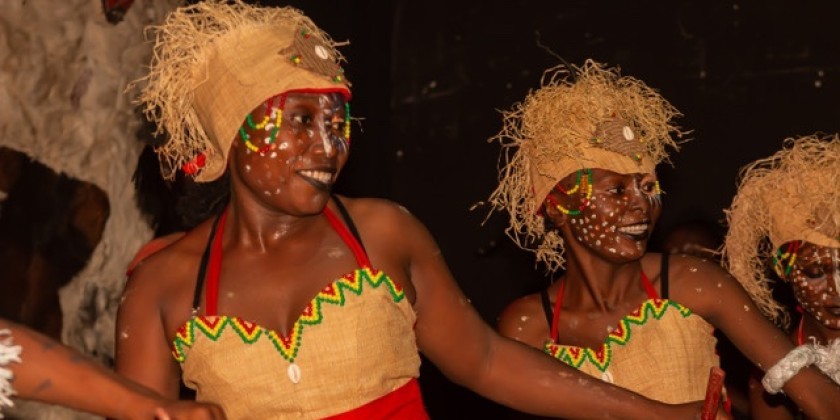
WHO: Conceived and directed by Andoche Loubaki
Text by Gervais Tomadiatunga
Choreography by Kuetolo Massende
Dancers and Drummers: Mfuambila El Brazza
WHERE: Espace Zola, Centre Culturel Zola
WHEN: July 28, 2024
Brazzaville, capital and by far the largest city in the Republic of Congo, has almost 3,000,000 people in its metro area and is very spread out. Past the rapids where the Djoué River joins the north shore of the Congo River, we turned off the main road onto a series of very rutted dirt roads leading to the outdoor stage where Andoche Loubaki's company Mfuambila El Brazza was about to start a rehearsal of Esprit. This was on July 15th and the premiere of Esprit was on July 28th 2024, culminating about a year of work, mostly online since Andoche was in New Jersey and the company in Brazzaville. Back in Congo, he had three weeks to get Esprit ready for its premiere.
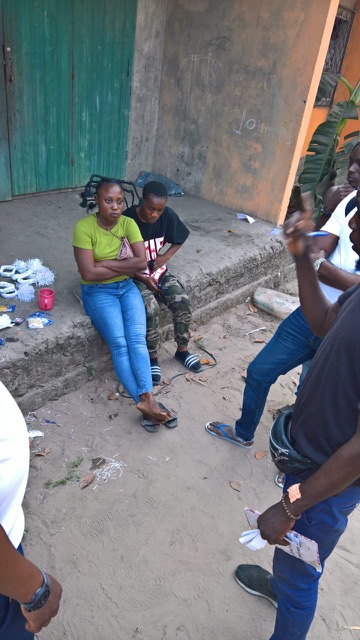
On the 15th, Esprit was still a work in progress. My husband, Don Burmeister, and I were impressed by what we saw. Two women and four men, one the choreographer Kuetolo Massende, danced, sometimes playing percussion instruments as they moved dynamically across the floor. The drummers tilted their Congolese long drums on their legs so that they could move with them. The story, about two grave diggers one of whom is possessed by a spirit from the grave, came in focus to some extent, with three other male dancers tackling the victim when he goes into possession.
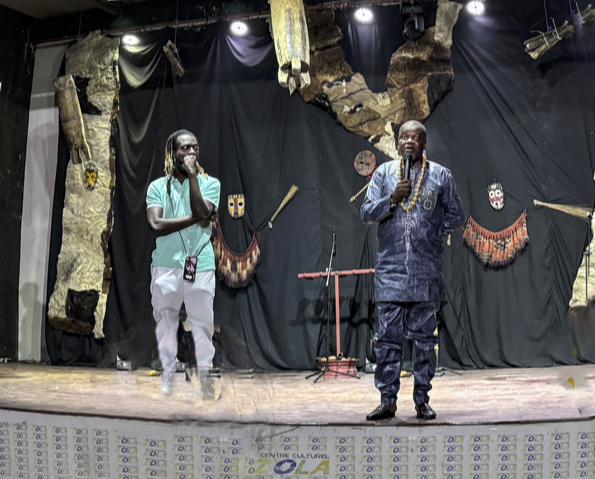
Esprit’s motivating story, conceived by Andoche and written by Gervais Tomadiatunga, and part of the show’s handsome and intriguing poster, full of masks and spirits, was recited: “Un peuple mystérieux, des dieux et fantômes, où l’esprit des ancêtres règne sur le destin des vivants.” (A mysterious people of gods and phantoms, where the spirit of the ancestors reigns over the destiny of the living.) Gervais, an inimitable and spectacular dancer, immediately erupted in a very scary dance, ending with his eyes popping out in maximum fear. The choreographer, an extremely fine dancer, copied this in his own way, but couldn’t get his eyes to pop out.
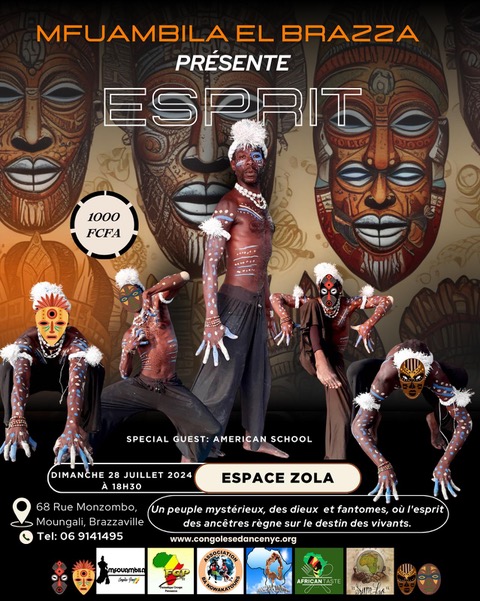
Later, Gervais further amplified the meaning of the show. He wrote (in my translation): At the heart of this voyage are the spirits of the ancestors, silent but powerful guides, with a wisdom and force that transcend the ages. They manifest themselves in ceremonies, songs, dances, and rituals, making a sacred connection between the past and present, the visible and invisible.
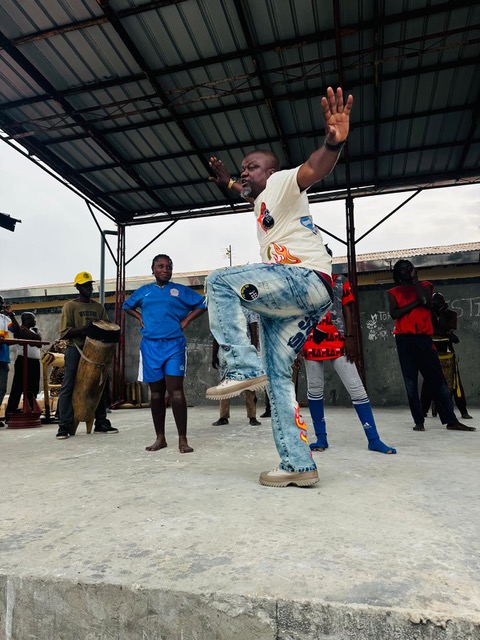
By Tuesday, July 23rd, when the company assembled at Espace Zola to mount Esprit in the theater where it would premiere, the full richness of the spectacle was on display. The stage here was considerably smaller than at the outdoor site and adjustments were made.
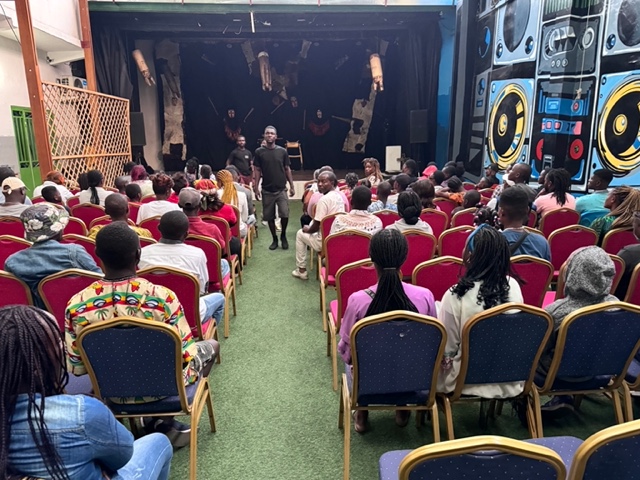
I hadn’t seen the rehearsals where Esprit continued to develop, but by this time I had seen much more dance in Brazzaville, from an informal street performance to an exuberantly acrobatic drum-dance group to the National Ballet. The Mbondo festival, a new event, helped define the vibrant scene. This was a contest with 16 companies and three categories: drum dance; traditional, based on traditional rhythms and movements that could still be displayed in inventive ways, and the smallest category, ballet, a form combining the prior elements plus anything that might be added to tell a story and produce a spectacle. Esprit falls into this latter category.
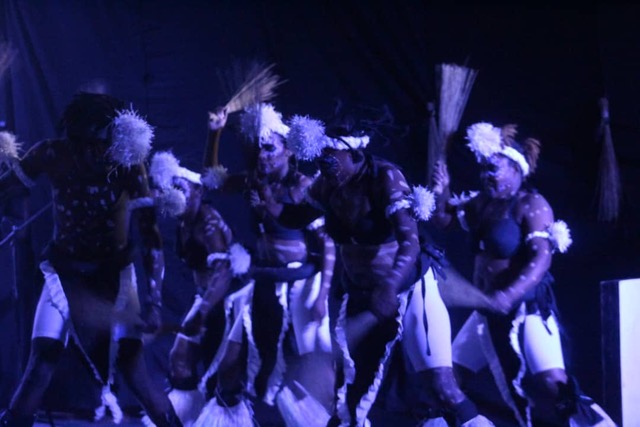
Dancers of Mfuambila El Brazza in performance. Photo courtesy of the author
On the 23rd, I saw the drummers dance, more women dancing, more dense, complicated, and compelling choreography; and how the story was working out. There was now a priest who intoned the defining words about ancestral spirits, but there was no solo dance afterward; it no longer seemed necessary. The singers and extra percussionists were always on target. But more drama still seemed possible.
On July 25th, a large group of us assembled at the outdoor rehearsal stage to watch Esprit while it was videoed. The lighting and staging seemed not quite set, and the spectacle began slowly and quietly. When the dancer possessed by the spirit brushed by my plastic chair in the audience, it was definitely alarming, but I still felt his part could be enlarged and more thoroughly integrated into the production.
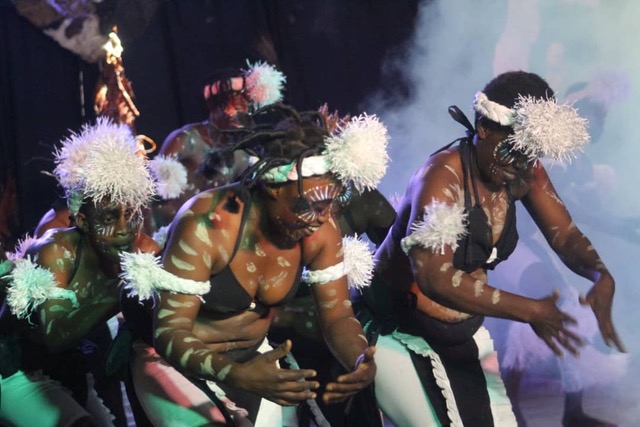
Dancers of Mfuambila El Brazza. Photo courtesy of the author
On July 28th, we assembled at Espace Zola expectantly. Slowly the theater filled. There was an emcee, a speech, and a good introductory drum-dance group. Then Esprit began.
In only three days, with clearly a lot of hard work by the supremely talented cast of over twenty people, the show had tightened and fulfilled its dramatic potential. From the way the men dug the grave and turned over the bones to the grave digger’s possession, his thrashing and being tied down, and his return several times with great dramatic force and surprise, from the rich and complicated dancing and drumming, acting and singing, to the moment when the possessed one was finally subdued, Esprit was totally captivating.
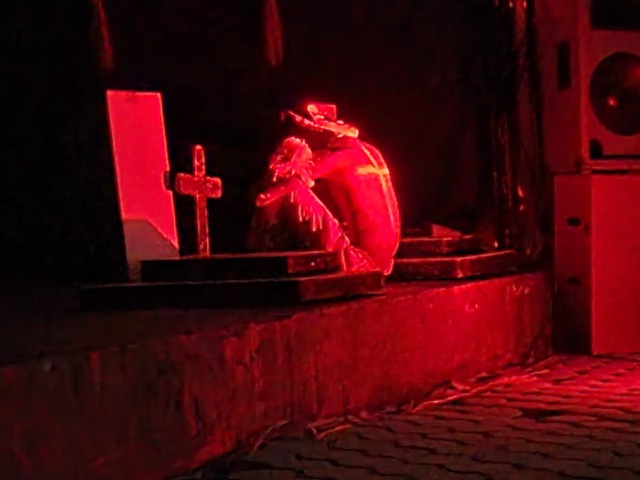
It was enhanced by its set with its masks and suspended drums, the lighting, and the costumes. The beautiful costumes for the six dancing women changed from black and white to raffia skirts with colored sections, to an emphasis on red, and skirts with panels flying out.
The dancing, featuring traditional Congolese movement, was powerful and very full bodied. It was full of torso complications, waists and hips moving, and strong, expansive legs. The women frequently kept their hips churning, demonstrating Congolese hip mastery with shifting moves and accelerating speed.
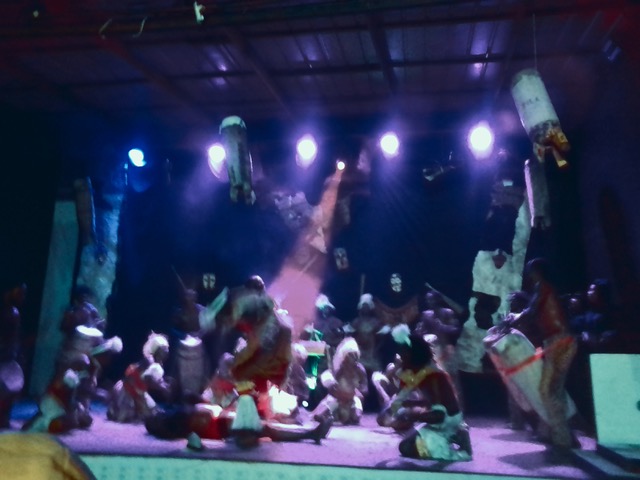
The drumming was potent, both that of the six drummers who played together, moving in patterns, and the two men who drummed intricate and powerful solos. Sticks and wooden instruments supplied additional percussion, and three women sang beautifully.. The dramatic elements now all worked to show the power of the ancestral spirits. The house was full; Esprit was triumphant.










